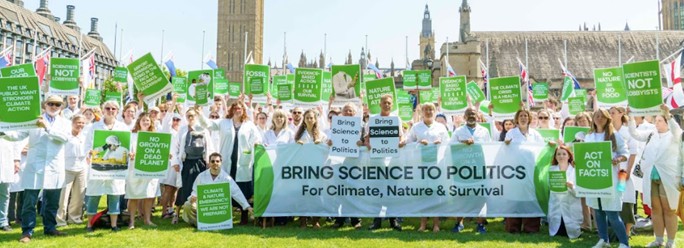FST BLOG
From publications to public actions: the case for responsible science activism
- 7 October 2025
- Dr Tracey Elliott

Many FST members are proud champions and practitioners of evidence-informed policymaking: advising decision-makers on wide-ranging policies, publishing hundreds of statements, declarations and reports, supported by thousands of peer-reviewed papers, and hosting countless events and workshops. Scientists throughout the world, similarly, are advising their own governments on multiple issues of the day.
Yet the world is getting hotter, greenhouse gas emissions continue to rise, extreme weather events are more frequent, the disparity between the haves and have-nots more acute, and our world is in the middle of a sixth mass extinction. As governments abandon net zero and renege on longstanding international commitments, and as ideologies trump evidence, and lies and misinformation become common currency, the case for evidence-informed policymaking and the battle for a fair, sustainable, liveable future for all are being lost. Decades of scientific evidence and advice are not being listened to and acted upon, nor with the scale and speed that is required to mend our broken planet.
Exasperated with the lack of political progress, and on the principle that scientists have an obligation not just to describe and understand the natural world but also to play an active part in helping to protect it, some scientists have turned to more activist approaches to convey their messages and draw attention to the climate and ecological crises (Grossman, 2024; Frickel and Tormos-Aponte, 2023). Continued government inaction, they believe, now justifies direct action, peaceful protest, and civil disobedience to expose the reality and severity of the climate and ecological emergency. As a still largely trusted and privileged community, scientists, they argue, have a moral imperative: with knowledge, comes great responsibility (Wyatt et al, 2024; Anguelovski et al, 2025).
Accordingly, a growing number of scientists – from across disciplines and career stages – are finding multiple ways to be heard: building and supporting social movements through research and teaching, writing op-eds and letters, giving media interviews, being vocal on social media, engaging their MPs, and taking to the streets in peaceful protest (Perrin et al, 2025). Examples of scientist activist groups include Scientists for Extinction Rebellion, Health for XR, and Scientist Rebellion. A recent survey has indicated that many scientists would like to do more but do not feel empowered to do so, for fear of losing professional credibility or even their jobs (Dablander et al, 2024). Nor do scientists tend to receive sufficient (if any) training in communicating their science in intelligible and compelling ways, outside peer-reviewed papers. Scientific institutions have an important role to play in supporting and protecting faculty, alumni and students who choose to be activists (Gardner et al, 2021) and in reforming their own institutional practices to “practice what they preach” (such as divesting from the fossil fuel industry and dramatically cutting back their international travel).
After decades in the established science-policy system, I am absolutely persuaded that responsible science activism, where traditional expectations of professional and political detachment in science are no longer appropriate and where actions speak louder than words, is both vital and urgent. I am persuaded that scientists need to be rational and more emotional, more human, in speaking knowledge to power; to engage publics more readily and effectively; and to act in ways commensurate with their warnings. And that scientific institutions need to prepare and protect them in this important role. More than ever, the world needs scientists to speak up and speak out, to affirm the reality, gravity and urgency of the multiple challenges we face. Not to do so undermines the science community’s messages and, arguably and provocatively, makes it complicit in climate denialism (Porritt, 2024).
A final observation. Recent participation in established science policy fora has brought into stark relief - for me - how comfortable, exclusive and self-serving our communities can be. It’s hard to bring in new voices and perspectives, to be disruptive or think creatively; it’s hard to challenge the rhetoric and break the mould. We regularly recognise and criticise this intractability in others - not least politicians and policymakers - but we don’t always see it in ourselves and reflect on our own inadequacies. Given the state of the world, I would expect to see an awful lot of frustration, soul-searching and perhaps even a little guilt from those working at the science-policy interface. But I haven’t found it; just well-trodden, pervasive mantras and well-meaning discussions that are often dizzyingly circular.
There is an urgent need for more scrutiny, critical self-evaluation, and brutal honesty from practitioners operating at the science-policy interface and from those shaping the governance, culture and responsibility of science. I believe the FST can provide a neutral, safe space for open and urgent debate on the role, and risks, of responsible science advocacy and activism. Both are a legitimate, vital part of the science community’s toolkit for communicating evidence to policymakers and publics; supplementing more traditional ways of influencing policy, and stimulating much-needed institutional and professional reform to become the green exemplars we so often demand from others.
Tracey works freelance for wide-ranging scientific organisations and networks in the UK, EU and globally; advising them on governance, strategy and operations. Prior to this, she served in various science-policy and international roles in the UK Civil Service.
